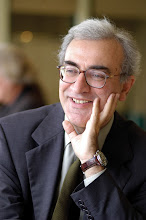(...) I find slightly off-putting what I sensed to be a dogmatic streak in Milton Friedman. I think his belief in the superior efficiency of free markets to government as a means of resource allocation, though fruitful and largely correct, was embraced by him as an article of faith and not merely as a hypothesis. I think he considered it almost a personal affront that the Scandinavian nations, particularly Sweden, could achieve and maintain very high levels of economic output despite very high rates of taxation, an enormous public sector, and extensive wealth redistribution resulting in much greater economic equality than in the United States. I don't think his analytic apparatus could explain such an anomaly.
I also think that Friedman, again more as a matter of faith than of science, exaggerated the correlation between economic and political freedom. A country can be highly productive though it has an authoritarian political system, as in China, or democratic and impoverished, as was true for the first half century or so of India's democracy and remains true to a considerable extent, since India remains extremely poor though it has a large and thriving middle class--an expanding island in the sea of misery. What is true is that commercial values are in tension with aristocratic and militaristic values that support authoritarian government, and also that as people become economically independent they are less subservient, and so less willing to submit to control by politicians; and also that they become more concerned with the protection of property rights, which authoritarian government threatens. But Friedman seemed to share Friedrich Hayek's extreme and inaccurate view that socialism of the sort that Britain embraced under the old Labour Party was incompatible with democracy, and I don't think that there is a good theoretical or empirical basis for that view. The Road to Serfdom flunks the test of accuracy of prediction!
I imagine that without the element of faith that I have been stressing, Friedman might have lacked the moral courage to propound his libertarian views in the chilly intellectual and political climate in which he first advanced them. So it should probably be reckoned on balance a good thing, though not to my personal taste. His advocacy of school vouchers, the volunteer army (in the era in which he advocated it--which we are still in), and the negative income tax demonstrates the fruitfulness of his master micreconomic insight that, in general, people know better than government how to manage their lives. But perhaps not always...
23.11.06
Posner sobre Friedman
Eis algumas palavras sábias de Richard Posner acerca do legado intelectual de Milton Friedman:
Subscrever:
Enviar feedback (Atom)




Sem comentários:
Enviar um comentário